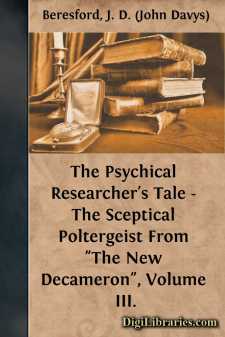Categories
- Antiques & Collectibles 13
- Architecture 36
- Art 48
- Bibles 22
- Biography & Autobiography 813
- Body, Mind & Spirit 142
- Business & Economics 28
- Children's Books 17
- Children's Fiction 14
- Computers 4
- Cooking 94
- Crafts & Hobbies 4
- Drama 346
- Education 46
- Family & Relationships 57
- Fiction 11829
- Games 19
- Gardening 17
- Health & Fitness 34
- History 1377
- House & Home 1
- Humor 147
- Juvenile Fiction 1873
- Juvenile Nonfiction 202
- Language Arts & Disciplines 88
- Law 16
- Literary Collections 686
- Literary Criticism 179
- Mathematics 13
- Medical 41
- Music 40
- Nature 179
- Non-Classifiable 1768
- Performing Arts 7
- Periodicals 1453
- Philosophy 64
- Photography 2
- Poetry 896
- Political Science 203
- Psychology 42
- Reference 154
- Religion 513
- Science 126
- Self-Help 84
- Social Science 81
- Sports & Recreation 34
- Study Aids 3
- Technology & Engineering 59
- Transportation 23
- Travel 463
- True Crime 29
The Psychical Researcher's Tale - The Sceptical Poltergeist From "The New Decameron", Volume III.
Categories:
Description:
Excerpt
There was once a time (he began) when I decided that I was a fraud; that I could not be a psychical researcher any longer. I determined to give it all up, to investigate no more phenomena nor attend another séance, nor read a word about psychical research for the remainder of my life. On the contrary, I planned an intensive study of the works of the later Victorians, of that blissful period in the history of Europe when we could believe in the comforting doctrine of materialism. "Oh!" I thought, "that one had a Haeckel or a Huxley living now to console us with their beautiful faith in the mortality of the soul!" The Neo-Darwinians failed to convince me; the works of H. G. Wells left me cold.
I will tell you the events that brought me to this evil pass.
It is not likely that anyone here will remember the Slipperton case. It attracted little attention at the time. In 1905 there was still a little sanity left in the world. A few even of the London dailies were nearly sane then, and refused to report ghost stories unless they were known to be untrue. And the Slipperton case had hardly any publicity—an inch in the Daily Mail, headed "Family Evicted by Ghosts," was the only newspaper report that I saw; though there may have been others. In these days the story would be given a couple of columns opposite the leader page; and the Sunday papers...
I was connected with the thing because Edgar Slipperton and his wife were friends of mine; quiet, old-fashioned people who believed that when you were dead you were dead, and that that was the end of it.
The phenomena that drove them out of their house at last were of the ordinary poltergeist type that date back to the days of John Wesley. The Slippertons had a fat and very stupid cook, whom I suspected of being an unconscious medium; but they were so attached to her that they refused to give her notice, as I strongly advised them to do. They told me that although she was constitutionally unable to grasp a new idea, such as the idea of a different pudding, she was entirely dependable, always doing the same things in the same way and with the same results. And while this confirmed my suspicions that she was a spiritualistic medium, I recognised that she might have useful qualities as a cook.
The Slippertons stood it pretty well for a time. At first they were only mildly inconvenienced. Things used to disappear mysteriously, and turn up in unexpected places. Slipperton's pince-nez, for example, were lost, and found inside the piano. And Mrs. Slipperton's "false front" would be moved in the night from the dressing-table to the brass knob of the bed-post, even after she took to pinning it to the toilet cover. Things like that; irritating, but not really serious.
But the trouble increased, grew to be beyond endurance in the end. The poltergeists, with that lack of imagination which always characterises them, started to play the old trick of pulling off the Slippertons' bed-clothes in the middle of the night—one of the most annoying of the spirits' antics. And they followed that by experimenting with the heavy furniture.
I was out of England when the trouble came to a head, and I heard nothing of the later developments until after the Slippertons had left the house. I happened to meet Slipperton by accident in the Haymarket, and he took me into his club and gave me the whole story. Naturally, I was glad of the chance to investigate, although I thought it very probable that the phenomena would cease with the departure of the cook. I determined, however, to go down and spend a week in the house, alone. I was not dismayed by the fact that I should be unable to get any help with my domestic arrangements, owing to the superstitious fears of the villagers....





